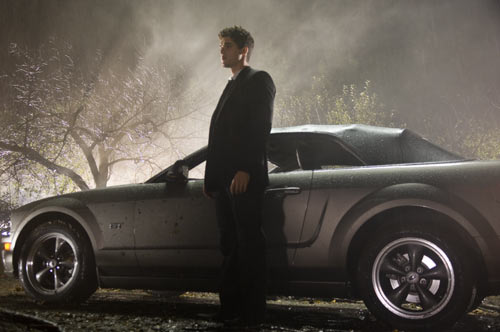On Monday evening I went to Berkeley to see Kimjongilia, a documentary about North Korea, its escapees, and its dictator. The film had its high points but these were tempered by some seriously awful camera work.
For the most part the film was made up of interviews with defectors from the Communist regime. The majority of the interviewees had been prisoners in North Korean gulags sentenced for a family member’s crime not even their own. The practice in N. Korea is to send three generations of a family to the gulag as punishment. So if your father is caught listening to an unsanctioned radio broadcast, for example, his parents, your mother, and all your brothers and sisters are also sent to prison. In prison, N. Koreans perform forced labor; the goods of which contribute to the country (military uniforms, raw minerals, etc), but some are also sold abroad (paper flowers to France, bras to Russia). The fact that other countries continue to buy items from N. Korea astounded me.
Of course, not all the interviewees had been sent to prison, two notable exceptions were a pianist and a singer. The piano player had been raised in the Conservatory–one of the country’s elite. If your family has never been accused of a crime you might remain near the top of the ranking system (there are 32 levels in all). Pretty much all of the country’s members in good standing live in Pyongyang, have access to food, and are granted more privileges than the rural people who eat grass, tree bark, and mice to survive. That is, if they can catch the last item. So the piano player was sent to Russia to continue his training and was flabbergasted to suddenly be exposed to the entirety of Western music. In N. Korea you play what is allowed by the state or you go to prison. Predominantly this means classical Korean music; nothing connected to capitalism is allowed. So the greats of Western musical traditions are neglected. Anything modern is completely unheard of. The piano player tried to practice some French composer once he was back in Pyongyang and was overheard. He stole money to bribe the border police and escaped the country because he didn’t want to have his musical tastes stifled. But not before being hung up and beaten for 14 hours.
The singer’s voice was compared to South Korean popstars which was, obviously, frowned upon. She fled the country with her mother and sisters to avoid prison. But once in China, they were all sold into sex slavery. She and her family didn’t escape that condition for five years when she stormed the South Korean embassy and demanded asylum.
One of the escapees wrote a book titled Aquariums of Pyongyang. His family (three generations) were sent to a gulag–I think it was No. 14–but he was allowed to bring one of his aquariums with him. He doesn’t say in the film, but I’m willing to guess his family eventually ate the fish. Another defector, who was a captain in the military, escaped with his family via boat down across the 38th parallel. He now works for Free North Korea Radio in Seoul. They broadcast to N. Korea (illegally by N. Korean standards) for 6 hours a day trying to describe to a beaten people the tenants of democracy and how they need to stand up to their oppressors to gain what they’re entitled to. Human rights in N. Korea are obviously non-existent due to the totalitarian control of the government and Kim Jong Il and that is one of the ideologies of the developed world that Free North Korea Radio is trying to deliver to their countrymen.
Several of the interviewees claimed that upon the collapse of the government they would be back in North Korea within a day. Others cry while expressing their bitter hatred towards the country of their birth and state that they will never go back.
As a documentary, I think Kimjongilia was well done. It showcased a situation with first hand testimonials that many people know very little about. It did this with care and real feeling for what has been suffered. The director also chose to intersperse the interviews with clips from propaganda films made in North Korea as well as performance pieces glorifying the state and the Kim family that have been filmed and smuggled out. In addition due to her theatrical/dance background the director chose to incorporate some footage of ballerinas doing interpretive dance. One was dressed in a modified Korean garment and the other was in a traffic cop uniform. I liked these all right but thought some of the editing effects detracted from their impact. In addition the camera work in a few of the interviews was horribly distracting–super shaky close-ups with jerky movements. So as a film Kimjongilia still needs some work but on the whole, I think it contained a powerful message raising awareness of an awful situation.


